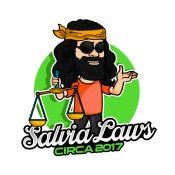Salvia (Salvia divinorum) is an herb in the mint family found in southern Mexico. The main active ingredient in salvia, salvinorin A, changes the chemistry in the brain, causing hallucinations (seeing something that seems real but isn’t). The effects usually last less than 30 minutes but may be very intense and frightening.
Although salvia is not illegal (according to Federal law), several states and countries have passed laws to regulate its use. The Drug Enforcement Administration lists salvia as a drug of concern that poses risk to people who use it.
United States- Laws vary by state
In the United States, Salvia is not regulated under the Controlled Substances Act but some states, including
- Delaware,
- Illinois,
- Louisiana,
- Missouri,
- Virginia,
- Tennessee,
- Texas, and others, have passed their own laws.
Several other states have proposed legislation against Salvia, including
- Alabama,
- Alaska,
- California,
- Florida,
- Georgia,
- Iowa,
- New Jersey,
- New York,
- Ohio,
- Oregon,
- and Pennsylvania.
Where to Get Salvia
Many of these proposals have not made it into law, with motions having failed, stalled or otherwise died, for example at committee review stages.
Psychoactive salvia exists in a legal gray area. In general, Salvia divinorum is regulated only loosely around the world—it’s legal in more places than it’s not. But the plant is still out of legal reach for many in the United States, Canada, and Europe. In the United States, the majority of states have banned salvia as a controlled substance. But not every state has adopted hardline policies toward the plant. Similarly, salvia is regulated differently across Europe. Most European countries have banned the possession and sale of the plant, but a handful, like Denmark, regulate salvia as a potential medicinal plant.
How to Get Salvia Plants
Buying salvia can be a tricky process—the herb is largely unregulated in most places where it is legal, making it difficult to ensure the safety and integrity of salvia products. In Mexico, the herb can be foraged in the wild. But, in other parts of the world, salvia comes from small to medium-scale cultivators.
Salvia Seeds & Plants
The odd nursery in legal U.S. states may stock Saliva divinorum plants, but chances are the pickings are slim. Most nurseries and garden centers stock many different types of salvia, but divinorum is not often one of them. Even in states where salvia is legal, the plant’s hallucinogenic reputation means that many large nurseries avoid the plant. So, connecting with a local enthusiast may be the easiest way to find a salvia plant if you’re interested in growing one yourself—where it’s legal, of course.
Some small businesses also ship salvia plants and seeds to legal U.S. states. But, before you buy, it’s always recommended to check reviews and contact the supplier to ensure that you’re purchasing from a safe and reliable source. If a supplier offers to ship plants or seeds to a region that outlaws the plant, consider it risky.
Dried Salvia
Dried salvia is one of the most common ways to purchase the plant. Dried salvia looks a lot like any dried spice; little flecks of green leaves. But, given the gray legal status of salvia in most Western countries, buying dried salvia from a gas station or head shop can be a risky task. Many products sold as dried salvia or “herbal incense” may actually be different herbs coated with salvia extract.
Psychoactive Salvias: Using Extracts
Salvia extracts contain concentrated Salvinorin A, the primary psychoactive terpene in the plant. This extract is often sprayed onto spice mixes in varying concentrations, which means that you can theoretically smoke saliva that is substantially stronger than what naturally occurs in the plant. But the overall safety of these concentrated extracts is generally unknown; they’re not standardized or subject to basic safety regulations, as put forth by the U.S. Food and Drug Administration. Further, the use of extracts is very different from the traditional use of the herb, which is chewed and not smoked. So, overall, salvia extract is a very new commodity and little is known about its relative safety.
Hello! My name is John Marston. I discovered the enchanting world of salvia divinorum back in 2009 and have been captivated by its magic ever since. Over the years, I’ve written extensively on this topic, crafting hundreds of articles for various websites, news outlets, and newsletters. My goal is to share my passion for salvia and spread awareness by providing valuable legal information through my website, SalviaLaws.Com.
